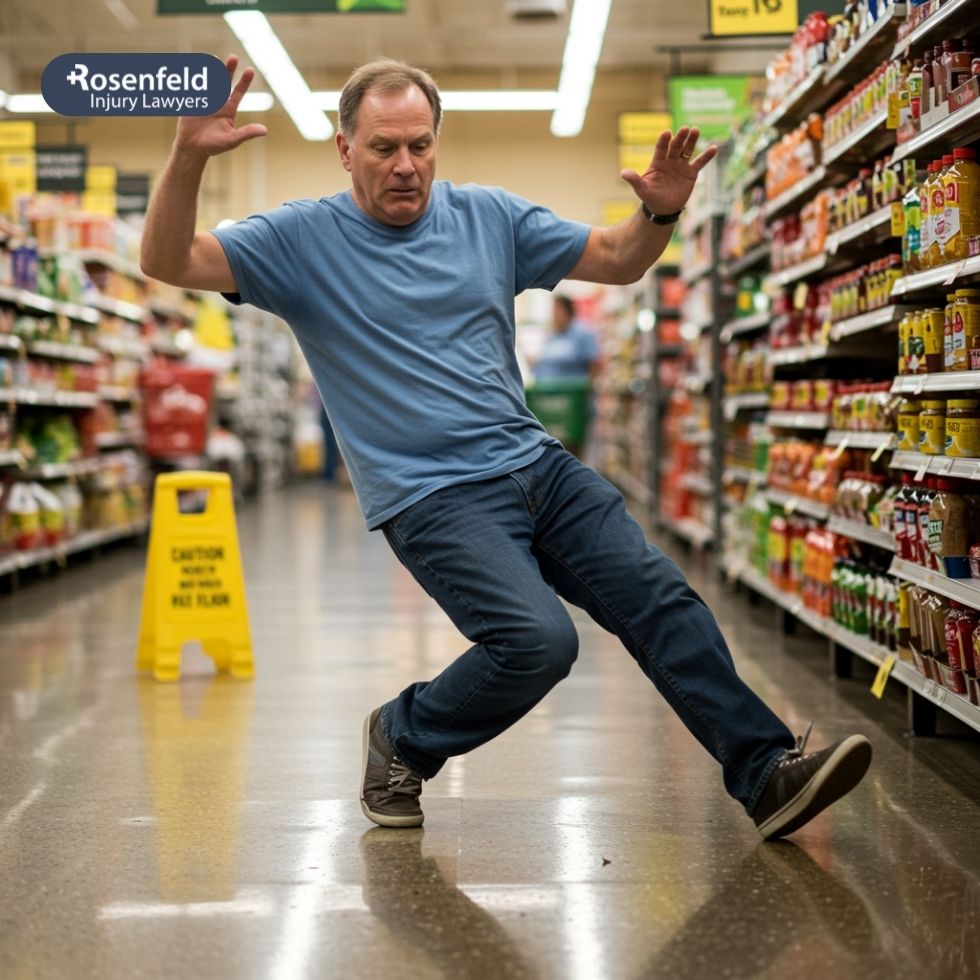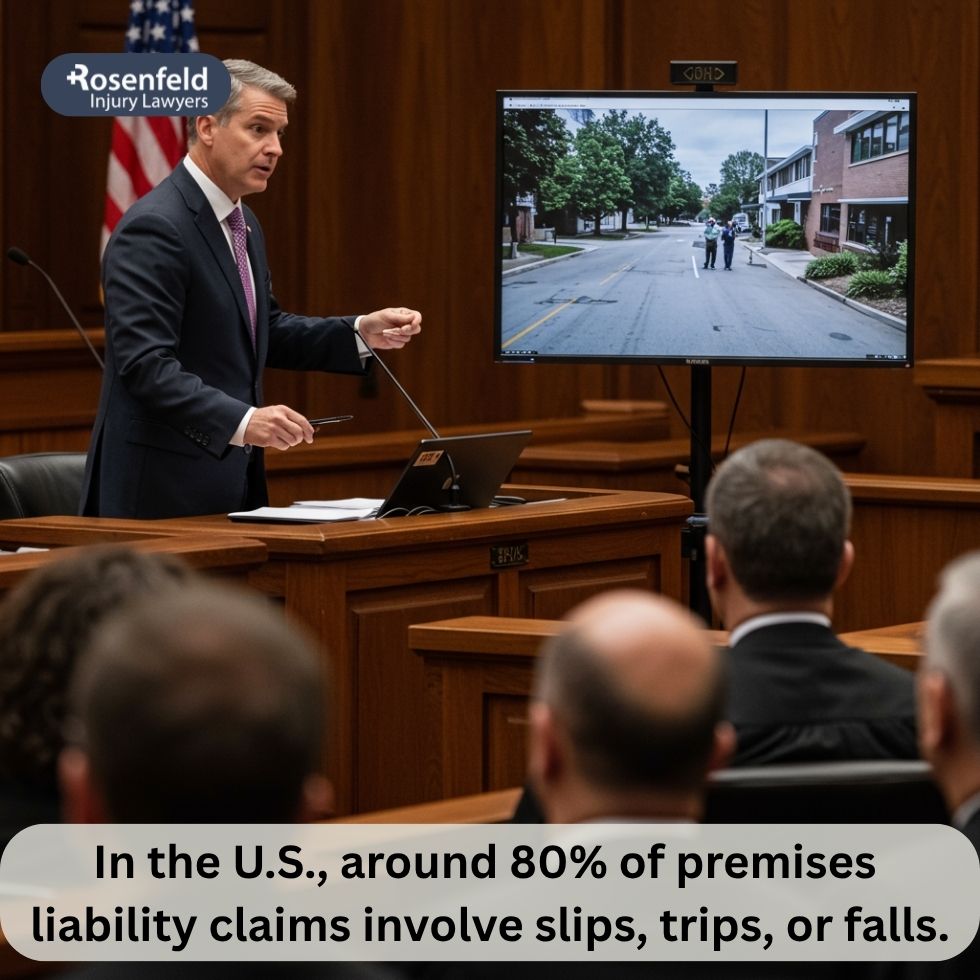A Comprehensive Guide to Illinois Premises Liability Law
Understanding Your Rights and Obligations in Chicago
When you slip and fall on an icy sidewalk along Michigan Avenue or trip over uneven flooring inside a Loop coffee shop, it’s more than a simple mishap; it could be a valid legal claim under Illinois premises liability law.
In Chicago, property owners and managers—from bustling retail stores in the Magnificent Mile district to restaurants lining Navy Pier—are legally obligated to maintain safe premises for patrons and visitors. Yet each year, countless Chicagoans sustain preventable injuries caused by hazardous conditions like wet floors, defective staircases, and improperly cleared sidewalks.
If you or someone you love has suffered injuries due to negligence or dangerous property conditions in Chicago, expert guidance from seasoned attorneys is crucial. At Slip & Fall Injury Lawyers, we specialize in premises liability cases, understand the nuances of Illinois law, and have a proven track record navigating Cook County’s civil courts.

What Is the Illinois Premises Liability Act?
The Illinois Premises Liability Act (Illinois Compiled Statutes 740 ILCS 130/) is the cornerstone of state law governing injuries that occur on someone else’s property. It establishes that property owners and occupiers have a duty of reasonable care toward lawful visitors. This means actively maintaining safe conditions and addressing hazards as soon as they are known—or should have been known—through reasonable inspection.
The act makes clear that owners can be held liable if a hazardous situation causes injury and the danger was foreseeable. In Chicago, this could include a grocery store on State Street failing to mop up a spill for hours or an apartment complex in Uptown leaving icy walkways untreated after a storm. The law applies to both private and commercial properties, as well as public areas.
The statute also rejects broad immunity. A simple “Enter at your own risk” sign rarely eliminates responsibility. Owners must provide adequate warnings and take corrective action. This framework is central to any premises liability claim in Illinois.
What Are the Key Principles of Premises Liability in Illinois?
While the act sets the legal foundation, there are several core principles to establish a valid premises liability claim. First is the concept of duty: property owners owe lawful visitors a responsibility to keep the premises safe. Second is notice: plaintiffs must show the owner had actual or constructive knowledge of the hazard. Third is causation: the dangerous condition must directly cause the injury.
In practice, Chicago courts often examine whether the hazard was “open and obvious.” For example, if a cracked sidewalk in front of a Lincoln Park coffee shop is clearly visible, the property owner might argue that visitors should have avoided it. Yet, exceptions exist, like when the owner could anticipate people would be distracted or compelled to encounter the hazard.
These principles apply equally to retail spaces, rental properties, and public venues. Understanding them is critical for both injury victims and property owners defending against a claim.
What Can Property Owners Be Held Liable in Illinois?
To be held liable under Illinois law, a property owner’s conduct must meet certain criteria. The injured party generally must prove:
- A dangerous condition existed.
- The owner knew or should have known about it.
- The owner failed to take reasonable steps to fix or warn about it.
- The condition caused the injury.
For instance, if a restaurant in River North ignores repeated complaints about loose carpeting that later trips a customer, liability is likely. On the other hand, if the hazard developed moments before the accident with no reasonable chance for the owner to address it, liability may not attach.
Illinois law also considers the status of the visitor—invitee, licensee, or trespasser—though the Premises Liability Act unified many of the duties owed to lawful visitors. These distinctions can still affect the strength of a case.
What Are Common Causes of Premises Liability Cases in Chicago?
Many premises liability incidents in Chicago stem from everyday situations where a property hazard was ignored. Slip-and-fall accidents are common, especially in winter when snow and ice accumulate outside businesses along Michigan Avenue or in neighborhood shopping plazas.
Other frequent scenarios include:
- Trip hazards: uneven sidewalks, broken stair treads, or loose flooring in retail stores.
- Falling objects: merchandise falling from improperly stacked shelves in large chain stores.
- Inadequate lighting: poorly lit stairwells in apartment buildings leading to missteps.
- Negligent security: assaults occurring in parking garages due to broken security gates or cameras.
Each of these examples can form the basis of an Illinois premises liability claim if the elements of notice and negligence are met.
What Is a Dangerous Condition Under Illinois Law?
A dangerous condition is any property defect or hazard that poses an unreasonable risk of harm to lawful visitors. Illinois courts interpret this broadly; it can be a physical defect, an environmental hazard, or even a combination of factors that create a safety risk.
Examples in Chicago might include a pothole in a busy parking lot, a slick subway platform at a CTA station, or malfunctioning escalators in a downtown shopping center. The key factor is whether a reasonable property owner would have identified and corrected the hazard before it caused harm.
What Are the Duties Owed to Visitors of Illinois Premises?
Owners and occupiers of Illinois premises have a set of ongoing duties under the law. These include:
- Conducting regular inspections to identify hazards.
- Promptly repairing known defects.
- Providing clear, visible warnings when immediate repairs aren’t possible.
- Complying with building codes and safety regulations.
In Chicago, compliance with municipal ordinances—such as snow removal rules outlined in the Chicago Municipal Code 10-8-180—is part of this duty. Failure to meet these obligations can strengthen a claimant’s argument that the owner breached their duty of care.
Importantly, duties can vary depending on the type of property. Commercial landlords may have broader responsibilities than residential owners, and public entities may have statutory immunities that limit certain claims.
What Types of Injuries Occur on Illinois Premises?
In slip and fall incidents and other property‑related accidents, victims can sustain injuries caused by a wide range of hazards. These may include fractured bones, concussions, spinal cord injuries, and soft‑tissue damage. The cause often traces back to known hazards such as uneven flooring, inadequate lighting, or slick surfaces.
What Damages Can Victims Recover?
The damages available in premises liability claims in Illinois go beyond immediate medical expenses. Victims may also seek compensation for lost wages, future treatment costs, and the impact on quality of life. In certain cases—especially where the conduct was reckless or intentional—courts may award punitive damages to punish wrongdoing and deter similar acts.
Claims often involve various parties, from commercial landlords to municipal entities, depending on who had control over the property and what the premises knew about the hazard. When supported by strong evidence, an injured person can recover compensation for both economic losses and non‑economic harms such as pain and suffering. These awards are designed to restore the victim, as much as possible, to their position before the accident occurred.
How to Strengthen Your Premises Liability Incident in Chicago
If injured on someone else’s property in Chicago, taking the right steps immediately can significantly impact the success of a premises liability claim:
- Seek medical attention right away and keep all records.
- Document the scene with photos or video, focusing on the dangerous condition.
- Report the incident to the property owner, manager, or relevant authority.
- Gather witness information for potential testimony.
- Preserve evidence such as clothing or shoes worn during the accident.
How Long Do Injured Victims Have to File a Premises Liability Claim in Illinois?
The statute of limitations in Illinois (735 ILCS 5/13-202) generally allows two years to file a personal injury lawsuit. Timely action is key. Consulting with an attorney familiar with local courts, such as the Circuit Court of Cook County, can ensure critical evidence is preserved and deadlines are met.
The Importance of Legal Guidance in Illinois Premises Liability Cases
Navigating premises liability law without professional help can be challenging. The legal framework demands proof of duty, notice, and causation, each supported by credible evidence. In Chicago, these cases often involve both state statutes and local ordinances, requiring careful legal interpretation.
Whether the issue is a slip-and-fall in a store, a trip hazard in a public park, or inadequate security in a residential building, understanding your rights under the Illinois Premises Liability Act is the first step toward recovery. Property owners who fail to uphold their duties may be held liable for the harm caused, allowing injured parties to seek compensation for medical bills, lost income, and other damages.
Local legal counsel can make a significant difference, guiding claimants through the complexities of liability cases and ensuring that Chicago-specific legal standards are met.

FAQs
What does premises liability coverage cover?
It’s insurance that holds property owners and government property operators responsible for injuries to lawful visitors, such as an invited guest, when property isn’t properly maintained or potential dangers aren’t addressed. Coverage can pay for medical costs, legal fees, and settlements if the four elements of negligence—duty, breach, causation, and damages—are proven.
What is the statute of limitations on premises liability in Illinois?
You generally have two years from the injury date to file, though claims against government property operators may require earlier notice. Proving the four elements of negligence with evidence—like proof the property wasn’t properly maintained or the premises knew of potential dangers—is essential.
Is premises liability the same as landlord liability?
No. Premises liability broadly holds property owners accountable for hazards affecting lawful visitors, including invited guests. Landlord liability is specific to rental properties. In both, proving the four elements is key, and both can apply to landlords, commercial owners, or government property operators.
Book a Free Consultation
If you’ve been injured due to unsafe conditions on someone else’s property, our Chicago premises liability attorneys are ready to help. We handle every case on a contingency fee basis—meaning you pay no attorney’s fees unless we recover compensation for you. Contact Slip & Fall Injury Lawyers for a free consultation today. Let us protect your rights and pursue the justice you deserve under premises liability law.
Content reviewed by Chicago slip and fall accident lawyer Jonathan Rosenfeld of Rosenfeld Injury Lawyers LLC, who holds property owners and management companies accountable to obtain justice for injured visitors and tenants, and is a trial lawyer recognized by Super Lawyers, Lawyer Legion, and Distinguished Justice Advocates for premises liability litigation.







